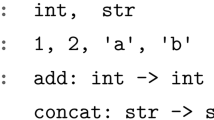Abstract
The Abstraction and Reasoning Corpus (ARC) is a challenging benchmark, introduced to foster AI research towards human-like intelligence. It is a collection of unique tasks about generating colored grids, specified by a few examples only. In contrast to the transformation-based programs of existing work, we introduce object-centric models that are in line with the natural programs produced by humans. Our models can not only perform predictions, but also provide joint descriptions for input/output pairs. The Minimum Description Length (MDL) principle is used to efficiently search the large model space. A diverse range of tasks are solved, and the learned models are similar to natural programs.
S. Ferré: This research is supported by Labex Cominlabs (ANR-10-LABX-07-01).
Access this chapter
Tax calculation will be finalised at checkout
Purchases are for personal use only
Similar content being viewed by others
Notes
- 1.
Data and testing interface at https://github.com/fchollet/ARC.
- 2.
- 3.
- 4.
Open source available at https://github.com/sebferre/ARC-MDL.
References
Acquaviva, S., et al.: Communicating natural programs to humans and machines. Adv. Neural. Inf. Process. Syst. 35, 3731–3743 (2022)
Ainooson, J., Sanyal, D., Michelson, J.P., Yang, Y., Kunda, M.: An approach for solving tasks on the abstract reasoning corpus. arXiv preprint arXiv:2302.09425 (2023)
Alford, S., et al.: Neural-guided, bidirectional program search for abstraction and reasoning. CoRR abs/2110.11536 (2021)
Chollet, F.: A definition of intelligence for the real world. J. Artif. Gen. Intell. 11(2), 27–30 (2020)
Ellis, K., et al.: DreamCoder: bootstrapping inductive program synthesis with wake-sleep library learning. In: PLDI 2021: Proceedings of the 42nd ACM SIGPLAN International Conference on Programming Language Design and Implementation, pp. 835–850 (2021)
Ferré, S.: Tackling the abstraction and reasoning corpus (ARC) with object-centric models and the MDL principle. arXiv preprint arXiv:2311.00545 (2023)
Fischer, R., Jakobs, M., Mücke, S., Morik, K.: Solving abstract reasoning tasks with grammatical evolution. In: LWDA, pp. 6–10. CEUR-WS 2738 (2020)
Goertzel, B.: Artificial general intelligence: concept, state of the art, and future prospects. J. Artif. Gen. Intell. 5(1), 1 (2014)
Grünwald, P., Roos, T.: Minimum description length revisited. Int. J. Math. Ind. 11(01), 1930001 (2019)
Johnson, A., Vong, W.K., Lake, B., Gureckis, T.: Fast and flexible: human program induction in abstract reasoning tasks. arXiv preprint arXiv:2103.05823 (2021)
Krizhevsky, A., Sutskever, I., Hinton, G.E.: ImageNet classification with deep convolutional neural networks. Adv. Neural. Inf. Process. Syst. 25, 1097–1105 (2012)
Lieberman, H.: Your Wish is My Command. The Morgan Kaufmann series in interactive technologies, Morgan Kaufmann / Elsevier (2001)
Menon, A., Tamuz, O., Gulwani, S., Lampson, B., Kalai, A.: A machine learning framework for programming by example. In: International Conference on Machine Learning, pp. 187–195. PMLR (2013)
Rissanen, J.: Modeling by shortest data description. Automatica 14(5), 465–471 (1978)
Silver, D., Huang, A., Maddison, C.J., et al.: Mastering the game of go with deep neural networks and tree search. Nature 529(7587), 484–489 (2016)
Vreeken, J., Van Leeuwen, M., Siebes, A.: Krimp: mining itemsets that compress. Data Min. Knowl. Disc. 23(1), 169–214 (2011). https://doi.org/10.1007/s10618-010-0202-x
Xu, Y., Khalil, E.B., Sanner, S.: Graphs, constraints, and search for the abstraction and reasoning corpus. arXiv preprint arXiv:2210.09880 (2022)
Author information
Authors and Affiliations
Corresponding author
Editor information
Editors and Affiliations
Rights and permissions
Copyright information
© 2024 The Author(s), under exclusive license to Springer Nature Switzerland AG
About this paper
Cite this paper
Ferré, S. (2024). Tackling the Abstraction and Reasoning Corpus (ARC) with Object-Centric Models and the MDL Principle. In: Miliou, I., Piatkowski, N., Papapetrou, P. (eds) Advances in Intelligent Data Analysis XXII. IDA 2024. Lecture Notes in Computer Science, vol 14641. Springer, Cham. https://doi.org/10.1007/978-3-031-58547-0_1
Download citation
DOI: https://doi.org/10.1007/978-3-031-58547-0_1
Published:
Publisher Name: Springer, Cham
Print ISBN: 978-3-031-58546-3
Online ISBN: 978-3-031-58547-0
eBook Packages: Computer ScienceComputer Science (R0)




